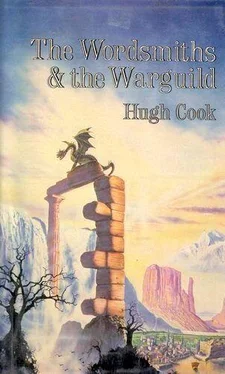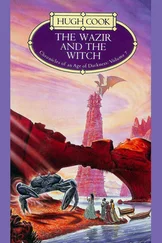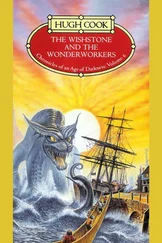Hugh Cook - The Wordsmiths and the Warguild
Здесь есть возможность читать онлайн «Hugh Cook - The Wordsmiths and the Warguild» весь текст электронной книги совершенно бесплатно (целиком полную версию без сокращений). В некоторых случаях можно слушать аудио, скачать через торрент в формате fb2 и присутствует краткое содержание. Жанр: Фэнтези, на английском языке. Описание произведения, (предисловие) а так же отзывы посетителей доступны на портале библиотеки ЛибКат.
- Название:The Wordsmiths and the Warguild
- Автор:
- Жанр:
- Год:неизвестен
- ISBN:нет данных
- Рейтинг книги:4 / 5. Голосов: 1
-
Избранное:Добавить в избранное
- Отзывы:
-
Ваша оценка:
- 80
- 1
- 2
- 3
- 4
- 5
The Wordsmiths and the Warguild: краткое содержание, описание и аннотация
Предлагаем к чтению аннотацию, описание, краткое содержание или предисловие (зависит от того, что написал сам автор книги «The Wordsmiths and the Warguild»). Если вы не нашли необходимую информацию о книге — напишите в комментариях, мы постараемся отыскать её.
The Wordsmiths and the Warguild — читать онлайн бесплатно полную книгу (весь текст) целиком
Ниже представлен текст книги, разбитый по страницам. Система сохранения места последней прочитанной страницы, позволяет с удобством читать онлайн бесплатно книгу «The Wordsmiths and the Warguild», без необходимости каждый раз заново искать на чём Вы остановились. Поставьте закладку, и сможете в любой момент перейти на страницу, на которой закончили чтение.
Интервал:
Закладка:
"You mean we have to climb up there!"
"Yes, and pull the ship up after us," said Draven, deadpan.
"Oh, bullshit," said Togura, realising he was being conned.
"Not so," said Draven. "There's no bulls in the Greater Teeth. Though fishshit makes a handy meal when the famines come."
"The famines?"
"Every tenth year they come," said Draven, solemnly. "All the little stones come to life. They crawl up from the sea. Feeding. You can hardly walk, for they're shifting under your feet. They'll eat the leather from your boots, the snot from your nose. If you're not careful, they'll crawl up your arse and eat – "
"Give it a rest," said Togura. "That's a story on stilts if ever I heard one. You won't get me believing a dreamscript like that – I'm not a child, you know."
"No?" said Draven. "You could've fooled me."
At that moment, they were hailed by a boat rowing out from a cleft in the cliff. Their courier cutter had been sighted by a lookout; soon more oar-boats came to meet them, and they were towed into the cleft, which was larger than it seemed at first blush. The cliff-cleft opened onto a small, rock-locked harbour, where they docked.
After a dockside conference at which news was exchanged – many of the women and children who had come to meet the cutter were soon weeping, for the cutter broughtnews of many deaths – some of the men set out in smaller boats to spread the news throughout the Greater Teeth. But Draven set off home. Tougura went with him.
They travelled through long, gloomy tunnels, reaching, at last, a cave home which had light shafts piercing through a seaward cliff face, and a waste shaft delved down sheer to the black night of a seafilled cave. In an inner chamber lit by smoky seal-oil lamps, Draven and Togura ate, feeding on crabs, fish paste, whelks, edible seaweeds, pickled onions and mushrooms.
Two of Draven's women served them. The women wore their hair in the leading fashion of the Greater Teeth: grown long, it was tied in a multitude of plaits evenly arranged around the head, so that some plaits, falling directly over the face, served as a veil of sorts. After the mela, the women – who did not speak to the men – served small cups of a hot, dark fluid which Togura took to be liquid mud.
"This is coffee," said Draven.
"Coffee?"
"Foreign stufff. We get it by way of loot, but seldom. It's rare, so drink – you'll not get it elsewhere."
Out of courtesy, Togura drank. He decided that he would not care if he never got it elsewhere. All things considered, he'd rather have an ale.
Togura supposed that he would get the chance of an ale soon enough, for there would surely be a homecoming feast of some kind. But he was wrong. There was no feast – only a gathering of sombre, serious men who came to talk politics with Draven. Who was forthright in his views:
"I said for starters we'd no business whoring after foreign wars. The sea's a steady business, we'd no need for speculations. This empire talk's no good for us."
"Many men," said a pirate, "support this Elkor Alish. They say he's got an army coming from Rovac."
"Ay, walking on water no doubt. Many man say this, and many men say that, but I tell you one thing for certain – many men are in their graves thanks to this empire nonsense. You speak of support for Alish. I say: here's a blade. Good steel, this. A length of it can unsupport a hero, if need be."
"Walk softly, friend Draven. Some would call that treason."
"Would they? And are we not free men? Since when did a pirate hold his tongue, under the sun or out of it? Treason, you say! What kind of lubber-lawyer talk is that? What next? A law of libel and a court of defamations?
"Come, friends, what's this talk of treason? This Elkor Alish weighs upon the earth like an emperor, yet his empire non-exists. Non-existing, how does it dare to claim our freedoms? All our gain is loss. We've had not a whit-jot benefit from these foreign wars, yet many men breathe earth or water thanks to this foolishness. I say: finish it. Elkor Alish can lord it over Runcorn with those who wish to be lorded over. But we: we lord it over ourselves. I say: if Elkor Alish ventures here, we'll feed him steel to breathe. This steel. With my own hand I'll do it."
Thus spoke Draven. Then, turning to Togura:
"Did you hear what we were talking of?"
"Me?" said Togura. "I'm stone deaf."
"Ay, and mute, too, if you're wise. Now, enough of this dirging! I'm home from the wars, I'll not talk blood and burial all night. Let's have a bit of sparking, hey? Deaf-mute, sing us a song."
Togura hesitated.
"What, silence?" siad Draven. "Is this how you repay hospitality?"
Togura knew, by now, something of the nature of pirate fun. It could well be that he was in the most fearful danger. What if they didn't like his singing? They might cut out his tongue! What if they did like it? They might reward him by cutting his testicles off – he had heard vague rumours of such things happening to favoured singers in far-off Chi'ash-lan.
Coming to a decision, Togura hauled out the casket which held his triple-harp.
"Sholabarakosh," said Togura.
"What kind of a song is that?" said Draven.
"It's not a song, it's the name of my harp," said Togura, taking the triple-harp from the box, which had now opened.
Shyly, he struck up a note. Then conjured up some percussion. Then suddenly, without warning, roused the air with trumpets louder than elephants. One man sat up so fast he knocked himself out against an overhang.
"That's something!" said Draven. "Can you pick up this tune?"
And he sang the tune of "The Pirate's Homecoming," the words of which begin like this:
"Her thighs were hot, her thighs were wide,
And ready she was waiting."
After a little bit of difficulty, Togura managed to pick up the tune. Soon he was embellishing it. Truly, as has been Written (in Golosh IV, magna 7, script 2, verse xii): Music hath Powers. Soon all the pirates, though they had no liquor inside them, were singing, clapping and slapping their thighs; and Togura, no longer in fear of death or demolition, was learning what it was like to be popular.
Chapter 39
The seas at the end of summer mourned onto the rocks of Togura's island of exile. He cast a chip of wood adrift. Watching it wash away in the waves, he wished himself home.
Elsewhere on the island, Draven was campaigning. The last leader of the pirates was dead, killed at Androlmarphos. Draven said that Elkor alish, who had led them since then, had no claim to their loyalty:
"After all, he's never had to face a vote in a free election. Remember that, boys. We all know that elections are the only way to get government of the pirates, by the pirates, for the pirates."
"But," said someone, "Elkor Alish is the world's greatest war-leader. We need an alliance with him. He can make us rich."
"Rich?" said Draven. "All the profit so far has gone to the earth, enriched with our blood and bones. I can't see that changing. If I could, of course I'd make an alliance for income – the pirate trade is thin at times, no doubting. But to make an alliance for the privilege of losing my liver? Now that's another story."
So spoke Draven.
But Togura, of course, never heard him.
Togura was far away, trying to decipher the weather-worn inscription of an ancient seashore tomb. Giving up, he sat down on a rock and looked out to sea. The sun was burning down into the Central Ocean. Soon it would be night.
Elsewhere, Draven was still at work.
Ten days later, he was still at it.
"I'm an honest man," said Draven, making politics to pirates. "You don't believe it? No doubt you've been listening to that fool Mellicks, a drunken sod of a sot with a barnacle backside, a liar since birth, like his whore-beefing father before him. Now listen here – "
Читать дальшеИнтервал:
Закладка:
Похожие книги на «The Wordsmiths and the Warguild»
Представляем Вашему вниманию похожие книги на «The Wordsmiths and the Warguild» списком для выбора. Мы отобрали схожую по названию и смыслу литературу в надежде предоставить читателям больше вариантов отыскать новые, интересные, ещё непрочитанные произведения.
Обсуждение, отзывы о книге «The Wordsmiths and the Warguild» и просто собственные мнения читателей. Оставьте ваши комментарии, напишите, что Вы думаете о произведении, его смысле или главных героях. Укажите что конкретно понравилось, а что нет, и почему Вы так считаете.












